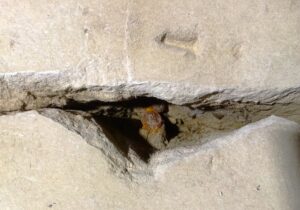Contact person: Ahmad Takriti
Funding: The Federal Waterways Engineering and Research Institute (BAW)
In the view of the safety and sustainability costs of maintaining our infrastructures, there is an urgent need to better understand the behaviour of materials under working conditions, i.e., environmental conditions and mechanical stress.

The aim of the project is explaining the failure of reinforcing steel, which has occurred in several locations in water-locks. In these locations, and in addition to the presence of a cracked concrete, the steel rebars endure alternating mechanical loading that caused the ca. 100-year-old steel to break, see Figure 1.
Modern reinforcing steel bars are produced in several ways. Regardless the manufacturing process, the final product is mainly designated according to the physical and mechanical properties. Therefore, and to investigate the reason for the rebars failure, the project is divided into three phases:
- Phase 1 comprises the investigation of the electrochemical behaviour of different types of reinforcing steel (according to DIN-488 ) in alkaline solution by electrochemical means of potentiodynamic polarization, electrochemical impedance spectroscopy etc..
- Phase 2 includes the examinations of the change of the electrochemical properties under on-going alternating slow dynamic loading under stress-controlled conditions.
- Phase 3 involves the investigation of electrochemical properties as well as strain-induced corrosion cracking on structural samples that are taken from the water-lock.

Letzte Änderung: 11. August 2023